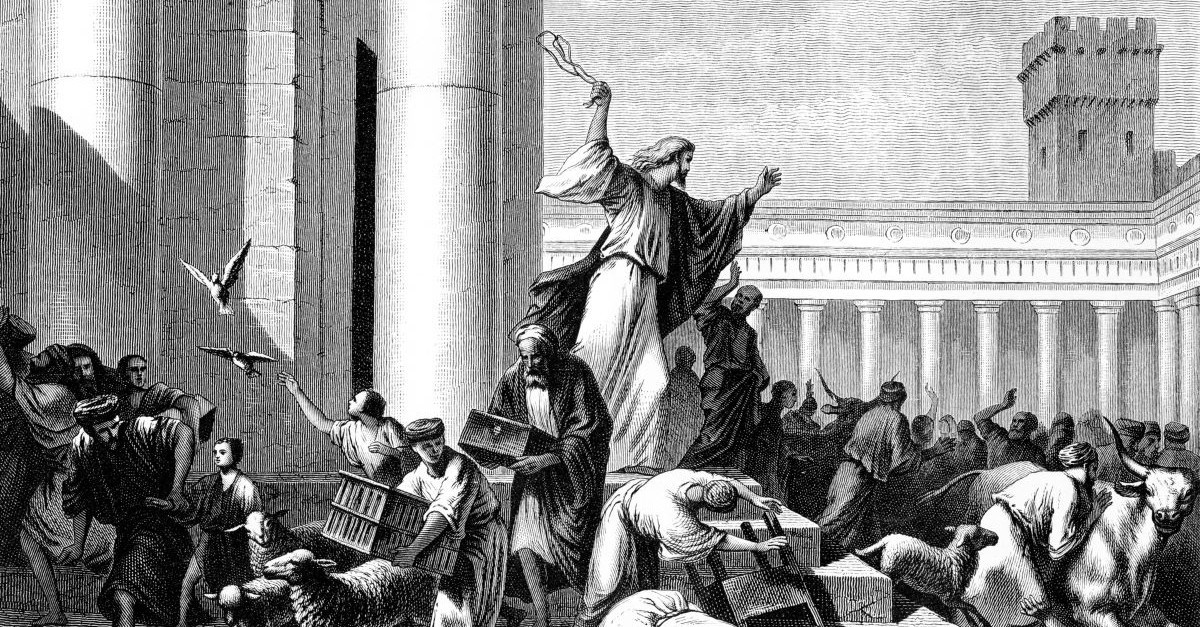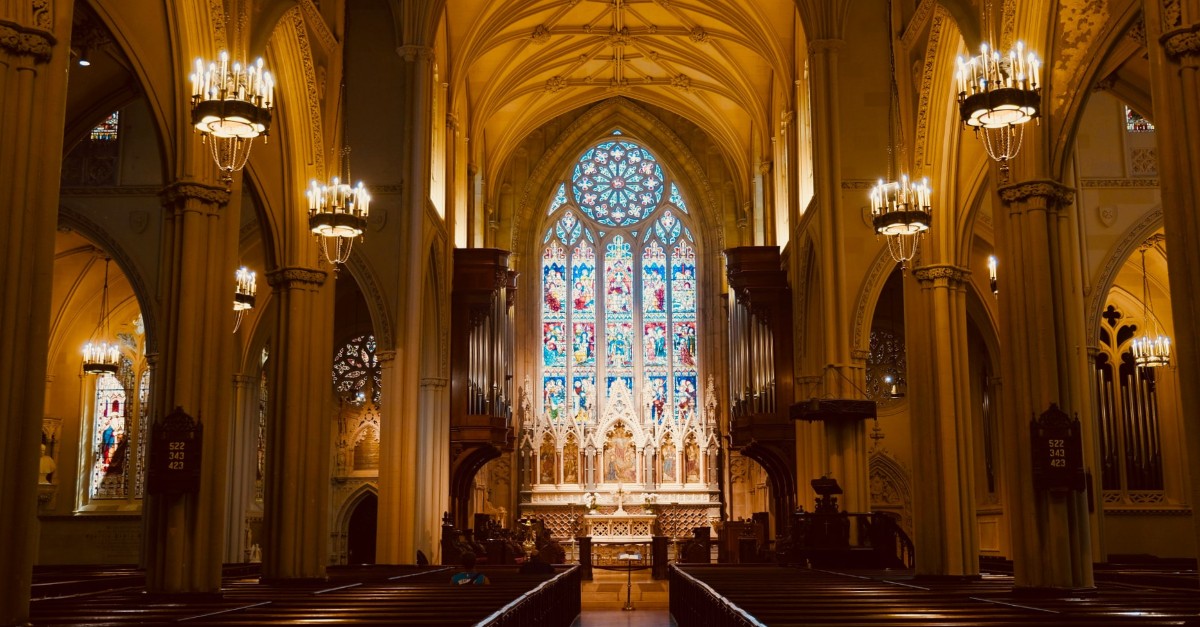
It was one of my favorite Jesus stories as a kid. Of course, I loved his teaching, the miracles, and the stories surrounding his death and resurrection, but when the Son of God goes into the Temple and starts flipping tables over and whipping the moneychangers, my young person brain perked up.
The story still fascinates me, but it has become more complex as I’ve learned more about the person of God through deep relationships in the Bible, and I’ve grown up a bit—a little.
To recap, in the days of Christ, the Temple had a different currency than the Roman coins. To give money to the Temple, required in some part by the Law, it must be with the Temple coin. The moneychangers set up shop in the outer court within the Temple itself to exchange the common Roman coin for Temple money. And these money changers made a profit, taking advantage of the people.
We may not have “moneychangers” in our modern churches, but we can take away important lessons from the actions of the Son of God.
Here are five things we can learn from Jesus flipping over the tables in the Temple.
Photo Credit: Getty Images/gabrielabertolini

1. Jesus is Zealous about His Father’s House
When Jesus flipped over the tables of the moneychangers, the Scripture describes his anger. The Gospels connect his action with a phrase from Psalm 69:9,
“Zeal for your house consumes me.”
This psalm of David deals with anger and sorrow around people's sins, which connects to the Messiah as the Son of David and dealing with injustice within the courtyard of the Temple.
Therefore, through overturning tables and driving out the moneychangers, Jesus not only addressed the issue of commercialization within the sacred space but also fulfilled the prophetic words of Psalm 69. Christ revealed a deep passion for the purity and holiness of the Temple as yet another sign he was the awaited Messiah.
For us today, however, God doesn’t live in temples made by human hands (Acts 17:24-28). In the New Covenant, because we are individually and collectively born again through the indwelling of the Holy Spirit, we are the Temple of God (I Corinthians 3:16). Jesus died and rose for us. He still has great zeal for the purity and growth of the Church. The Church is universal and expressed in local churches, and if God cares this much, we should also prioritize the House of God through participation and investment in the local church. The Church is the only institution, the family of God, that will endure eternally. It’s a great investment.
Photo Credit: ©GettyImages/wynnter

2. God’s House is Defined by Prayer
Because the Temple is God’s house, and he is Father and Lord, he has designs and purposes for this house. The Gospels refer back to Psalm 69 and his zeal for his house, but Jesus quotes a specific scripture during his righteous anger. Matthew 21:13, Jesus declares,
“It is written, ‘My house will be called a house of prayer,’ but you are making it 'a den of robbers!’”
Here, Jesus quotes Isaiah 56:7, emphasizing the divine intention for the temple to be a place dedicated to prayer.
By disrupting the commercial activities that had encroached upon the sacred space, Jesus restored the original purpose of the Temple as a house of prayer. God’s dwelling place should be characterized by a reverence for communion and communication with the Almighty.
In flipping tables, Jesus redirected the focus back to the spiritual act of prayer. This underscores the centrality of prayer in the worship within the Temple, as being the primary reason the Temple even existed. Yet the moneychangers had made it a “den of thieves.” Not only had they taken the place of prayer, but these profiteers had brought injustice within the Temple.
As Christians today, as the House of God, we should prioritize prayer. Unfortunately, many believers don’t commit themselves to regular prayer. Instead, career and making money or leisure dominates their thinking and time. We should remember to make prayer the number one priority, as we have the great Intercessor, Christ, living within us. We can move heaven and earth with prayer, so let us sacrifice what we must to prayer as our purpose.
Photo Credit: ©Getty Images/FotoDuets

3. Jesus Fights for the Poor and Marginalized
The moneychangers had set up their tables in the outer court. First, it was likely a practical position near the entrance before people had to deal with priests and sacrifices. At the same time, the outer court was designated for a particular purpose.
The Temple had a couple of main areas. The Law reserved the Inner Court for Jewish men who had kept themselves ceremonially clean. All other people—women, Gentiles, and those with disabilities, were only allowed in the outer court. As an interesting note, Jesus primarily taught in the outer court, as did the apostles in Acts, because everyone could gather there.
Therefore, not only were the moneychangers making a profit off religion, but they were also taking the place reserved for all people, no matter their background or status, to gather to God. The New Covenant, through the death and resurrection of Jesus, opened the door for an intimate relationship with God for all races and peoples who would repent unto the Lord.
The Old Testament continually asserts God’s heart for the poor and marginalized, as does the New Testament. Every person is made in the image of God, and he abundantly loves each and every individual. For believers today, we must remember how God identifies with the poor (Matthew 25:31-46) and measured the sheep and the goats by how they treated the marginalized. And as we remember this, let us take this truth into action and bring relief to the needy in the community and the world.
Photo Credit: © Getty Images/trumzz

4. Injustice within God’s House Angers Jesus
The Gospel of John places the story of overturning tables at the beginning of Jesus’ ministry. The other Gospels place the narrative upon his entrance into Jerusalem the week before his death.
The Lord is a God of justice. Justice and righteousness are the collective foundation of his throne (Psalm 89:14. God’s justice isn’t punitive. At its core, it's redemptive. In other words, God’s idea of justice means returning a person or institution to its original design. Because God is good, and so are all his plans and designs. So God seeks to redemptively return and restore all things to his design for their own good.
Injustice, the opposite of restoration and redemption, the resistance of his goodness, has no place in the House of God. How could God in the flesh teach every day in the Temple with injustice happening a few feet away? He couldn’t. Further, it angered him. Perverting for injustice what God means for good is a righteous reason to be angry. The Bible clearly expresses how God gets angry, and his goodness and love for what is just leads him to anger.
For we who are the House of God, let us make sure we examine ourselves and our local faith fellowships to weed out any injustice and commercialization of a free message, the Gospel. We should be generous to all, not taking advantage of anyone, especially in the name of money, profiting off the pain or weakness of others.
Photo Credit: Unsplash/JohnyVino

5. Intentional Spiritual Choice, not an Emotional Reaction
While we recognize Jesus became angry, we must also note this wasn’t an uncontrolled reaction.
When we get angry, our emotions can control us, and we act out of that anger, generally for revenge. But if our emotions are the guiding force, then the Spirit isn’t. And revenge doesn’t lead us to the restoration and redemption God seeks in his justice. He is a forgiving God.
From the time he was at least twelve years old, as a good Jew, Christ went to the Temple in Jerusalem three times a year. It wasn’t the first time he saw the money changers taking advantage of people. It likely angered and upset him every time.
Yet he waited to act until his Father told him to. Jesus said he only did what he saw his Father do (John 5:19). His actions were guided and directed by God. His anger wasn’t an excuse to act on his own. Neither should it be for us.
Injustice and perversion should anger believers, but our anger doesn’t legitimize our response from anger and vengeance to bring punishment. If the anger is righteous, we must continue in righteousness, which is by the leading of the Holy Spirit. We remain responsible to act in love. Anger apart from love of every individual isn’t righteous anger. Let us speak the truth and stand against injustice in love, toward even the perpetrators themselves. This is the heart of God.
In our highly charged political climate, with divisions made worse through social media and agenda-driven media, we must be careful to address our anger and reactions through the love of God in the Holy Spirit. The Spirit leads us into all truth, so we should pray to get discernment from the Father about what actually makes him upset, the truth of injustice, and the proper way to respond in love. With this, we’ll be the House of God we were meant to be.
Photo Credit: © Unsplash/Vivek Doshi

Originally published Wednesday, 24 January 2024.
